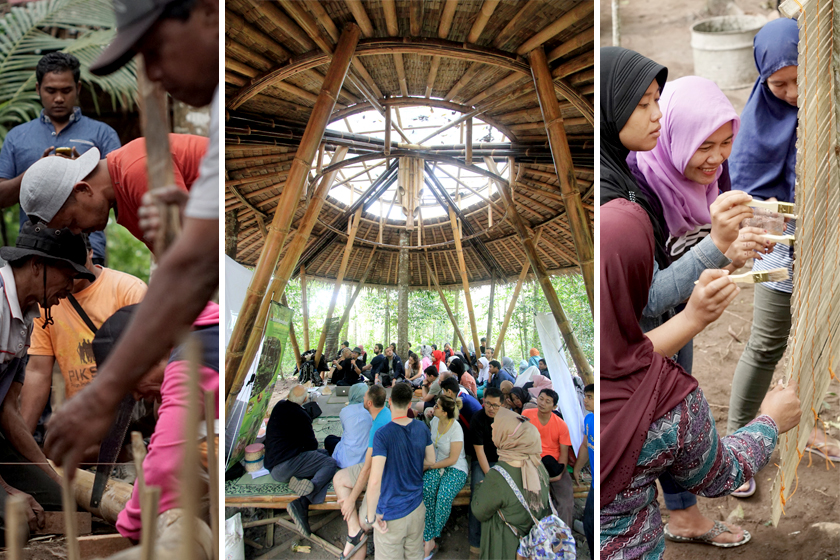Bamboo has long been used in many places in Asia, as a building material, for furniture and also as a food source. This giant member of the grass family is commonly used in Asia as disposable scaffolding for the construction of modern concrete buildings. However, on the slopes of Mount Merapi, Yogyakarta, bamboo has a whole new role.
At the Bambooland Social Enterprise (BSE) project, community members are trained in treating and processing bamboo and selling it as high-quality products, making more profit than if it was used as expendable construction material. Academics from the State Islamic University (UIN) Sunan Ampel, Surabaya, and the Islamic University of Indonesia (UII) in Yogyakarta, initiated the project, where 100 percent of the profits go to the community.
“We saw bamboo forests around the slopes of Mount Merapi. We saw a lot of potential there that was underutilised. So, we decided to develop it and started this initiative three years ago,” said Faruq Ibnul Haqi, a University of South Australia alumnus, who now leads the BSE project.
“Bamboo has for a long time been used as an alternative and sustainable material in architecture. What we’re doing is promoting it again as a product with a good future for the community. It has a lot more potential than being used once, then burned.”
Tapping bamboo’s environmental benefits
Following the big eruption of Mount Merapi in 2010, some of the rivers dried up after being covered with thick volcanic sand and rocks. To clear the rivers and avoid volcanic material flowing into farmland in future eruptions, the government permitted sand extraction.
However, illegal sand mining is now rampant and not limited to river areas. The illegal activity has caused adverse environmental impacts around the slopes of Mount Merapi, including receding ground water and landslides. Apart from environmental damage, the destructive activity has also had unwelcome social impacts.
“Many villagers around here are involved in illegal sand mining. They have to endure hard labour, unsafe conditions, and be poorly paid,” said Faruq, who is currently lecturing in the architecture program in UIN Sunan Ampel.
“We try to demonstrate an alternative for them. With bamboo, they can work in better conditions and get higher income,” he said.
Bamboo forests have a wide range of environmental benefits, including water regulation and controlling soil erosion. They also function as carbon sinks and produce oxygen. Bamboo continuously spreads, making it a sustainable and renewable resource, allowing faster forest formation compared to most other tree species.
“In the Bambooland area, the water springs are clean and potable,” said Faruq.
Living sustainably with bamboo
In August 2017, the Bambooland initiative was successful in the Alumni Grant Scheme (AGS) with a proposal to maximise the role of rural communities in the sustainable creative economy. The program also serves as community service for academics from UIN Sunan Ampel and UII Yogyakarta.
There are currently 70 people involved in the project, from an initial target of 30 people. They are offered training in bamboo planting and harvesting, construction and handicrafts, as well as workshops on enterprise development and digital marketing.
“Forty percent or about 25 of our members are women. They focus on bamboo handicrafts. Some of their products, bamboo blinds and boxes, are in the market now. The men specialise in construction, furniture making and harvesting,” said Faruq.
“Before we organise training, we carry out pre-workshops to map the community’s interest. Some are interested in being ‘bamboo rangers’, they will be out scouting which bamboo is suitable for harvesting. Some are interested in construction, others in furniture making.”
To guarantee their supply, half of Bambooland’s six-hectare area is planted with bamboo, and at least 10,000 more seeds will be planted to sustain production.
One piece of raw, untreated bamboo about six to eight metres can earn them IDR 25,000 (AUD 2.25). After it’s treated, preserved bamboo can cost up to IDR 150,000 (AUD 13.50). Handicrafts are valued even higher. With a production cost of IDR 50,000 (AUD 4.50), they can produce a bamboo audio speaker that can be sold for up to IDR 500,000 (AUD 45).
Other than producing bamboo products, under the AGS scheme, community members are provided training to turn their villages into tourist attractions. Business people from other areas in Java are invited to share their experience with BSE, and it partners with other communities or businesses focusing on bamboo preservation and sustainable use.
BSE has discussed sharing their concept with East and West Nusa Tenggara provinces, and Bambooland has even received visitors from Europe.
“Under this program that is supported by AGS, BSE is better known externally,” said Faruq. We have been contacted by people from other regions in Indonesia, from government officials, universities and NGOs. I hope we can continue the collaboration with AGS.”
If you’re an Australian alumnus who wants to make an impact, applications for the next Alumni Grant Scheme are open until 20 January 2018 at: https://www.australiaawardsindonesia.org/content/169/15/alumni-grant-scheme?sub=true


.jpg)
 A Social Enterprise in Central Java Brings Bamboo Back
A Social Enterprise in Central Java Brings Bamboo Back
